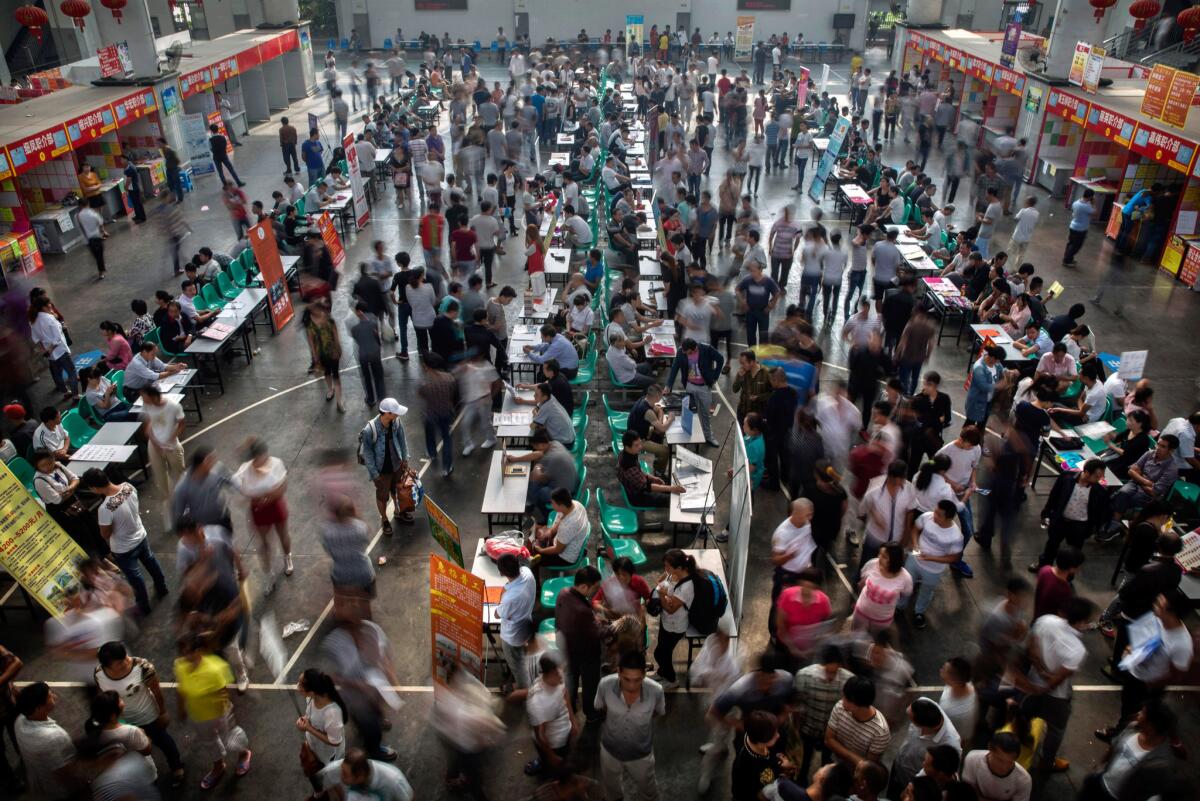The global economy is slowing as emerging markets struggle

Chinese workers gather around potential employers at a job center in Yiwu, China, on Sept. 18. A slowdown in manufacturing and exports in China is causing global concern that the world’s second-largest economy is running out of steam.
- Share via
Reporting from Washington — The global economy is slowing down.
The International Monetary Fund on Tuesday lowered its forecast for worldwide growth as a deceleration in China and other emerging markets is offsetting modest gains in the United States and developed nations.
The global economy will expand 3.1% this year, down from 3.4% last year, the IMF said. Growth is projected to improve to 3.6% in 2016.
See the most-read stories this hour >>
Both figures in the group’s quarterly world economic outlook are down 0.2 percentage points from July estimates.
“Six years after the world economy emerged from its broadest and deepest postwar recession, the holy grail of robust and synchronized global expansion remains elusive,” said Maurice Obstfeld, the IMF’s economic counselor.
The IMF slightly upgraded its forecast for U.S. economic growth this year to 2.6%, a 0.1 percentage point increase from the July estimate.
Growth will improve to 2.8% next year. But that estimate is down 0.2 percentage points from the earlier forecast.
The recovery is expected to pick up a bit in advanced economies to 2% this year. But emerging market growth is projected to decrease to 4% this year from 4.6% last year.
It would be the fifth straight year that economic growth has slowed in those nations, the IMF said.
The Chinese economy will expand by 6.8% this year, down from 7.3% last year.
China’s transition from an export-focused manufacturing economy to one driven by domestic consumption and services is among three powerful forces slowing global growth, Obstfeld said.
The other factors are the steep drop in prices for commodities, particularly oil, and a possible interest rate hike by the Federal Reserve.
As part of China’s transition, the nation in August changed the way it calculated the value of its currency. The move led to a devaluation that, along with fears of slowing global growth, roiled the financial markets.
As a result, the currencies of other emerging-market nations weakened and there was “an increase in global risk aversion,” the IMF said.
The global problems led Fed policymakers to hold off on a small increase in a key interest rate in September.
And a hike in the so-called federal funds rate, which has been near zero since late 2008, is looking less likely this month after a disappointing U.S. jobs report last week.
The IMF and World Bank have warned the Fed not to raise the rate this year.
Twitter: @JimPuzzanghera
ALSO:
Variable pricing may be a new theme at Disneyland
Trade deal puts a U.S. stamp on Asian economy
American Apparel files for bankruptcy but may need to do more to survive
More to Read
Inside the business of entertainment
The Wide Shot brings you news, analysis and insights on everything from streaming wars to production — and what it all means for the future.
You may occasionally receive promotional content from the Los Angeles Times.











